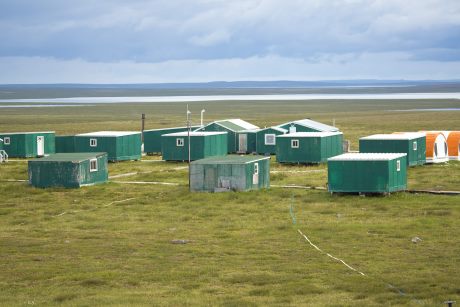Areva Resources Canada said it is "very disappointed" with a decision by Canadian ministers not to approve the proposed Kiggavik uranium project. The project has been placed in in care and maintenance while the company considers its next steps.
 |
| The Kiggavik exploration camp, pictured here in 2015, has now been mothballed (Image: Areva Resources Canada) |
The company said yesterday: "Areva and its partners in this project spent over eight years and tens of millions of dollars on the environmental assessment process. The Kiggavik Project, demonstrated through the Nunavut Impact Review Board (NIRB) review, had no unresolvable issues and would provide positive, long-term benefits to the Kivalliq Region."
The final ministerial decision to accept a 2015 NIRB recommendation that the uranium mining and milling operation should not be allowed to proceed at the current time was made public last week. The lack of a definite start date or development schedule for the project in the Kivalliq region of Nunavut was cited as a major obstacle.
"Having start date uncertainty is not unique to this project and it occurs quite frequently in Canada given the timeline for approvals and constantly changing market conditions," Areva said. The ministerial decision itself recognised that such a situation was common for proposed developments in Canada's northernmost regions and could largely be addressed under the provisions of existing planning legislation or through the attachment of terms and conditions.
"These provisions were discussed at length throughout the process and during the NIRB final hearing and we are obviously disappointed that they were not applied to the Project. As stated throughout the regulatory review process, Areva was fully prepared to re-evaluate and confirm the accuracy of our predictions should there have been a significant delay in project start date and to evaluate performance against predictions throughout operations," the company said.
Future plans
The ministerial decision, like the NIRB recommendation, is not that the project should never go ahead. Canada's minister for indigenous and northern affairs, Carolyn Bennett, has reiterated that Areva may resubmit the Kiggavik Project for consideration when a more definite start date is known. However, Areva said it has no immediate plans to resume exploration activities in light of the decision and current market conditions. "At the end of this nearly eight-year process, the question remains whether the Project, as designed, could meet the requirements for development in Nunavut at this time. Further, the decision by the authorities to not apply available remedies to take into consideration an uncertain project start date influences the company’s investment risk and future project advancement," it said.
"We will take some time to decide our next steps and will discuss with our partners in this project in the coming months. Areva continues to believe the Kiggavik Project is sound and can offer many benefits to Nunavut without compromising the environment," the company concluded.
Kiggavik is about 80 km west of the community of Baker Lake in Nunavut, which is Canada's northernmost territory. The project envisaged three open-pit mines at Kiggavik itself, plus an open-pit or underground mine at the nearby Sissons deposit. The project would also include a processing mill and an accommodation complex, plus a tailings management facility using the mined-out open pits at Kiggavik, as well as a dock site at Baker Lake. An operating life of 14 years of operation based on existing resources estimates of 132.6 million pounds U3O8 (51,000 tU) was envisaged.
The project is owned in a joint venture by Areva (64.8%), JCU (Canada) Exploration Co. Ltd. (33.5%) and Daewoo Corporation (1.7%).
Researched and written
by World Nuclear News




_23009.jpg)
_33392.jpg)
_53504.jpg)







